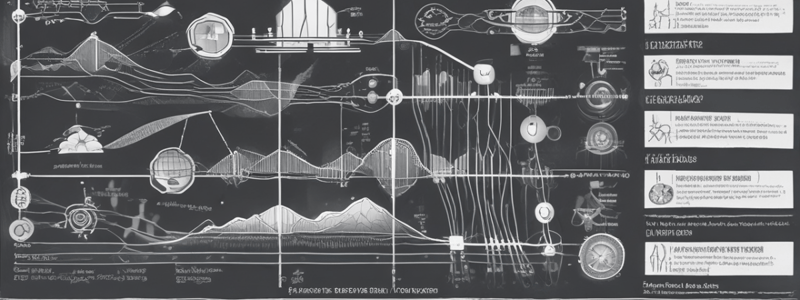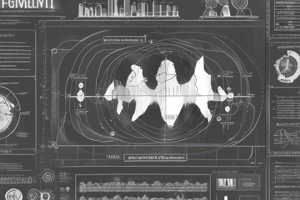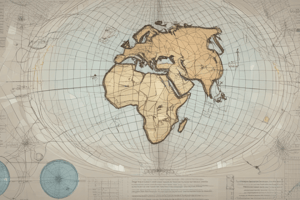Podcast
Questions and Answers
What is the main purpose of collecting data in a scientific experiment?
What is the main purpose of collecting data in a scientific experiment?
- To prove a hypothesis is correct
- To make observations
- To evaluate the validity of a hypothesis (correct)
- To confuse other scientists
What is a hypothesis in the context of a scientific experiment?
What is a hypothesis in the context of a scientific experiment?
- A testable explanation for an observed phenomenon (correct)
- A proven fact about a phenomenon
- A guess about the outcome of an experiment
- A random idea with no basis in reality
What is the ultimate goal of a scientific experiment?
What is the ultimate goal of a scientific experiment?
- To understand a phenomenon and potentially formulate a new hypothesis (correct)
- To collect as much data as possible
- To prove a hypothesis is correct
- To disprove a hypothesis
What is the role of initial observations in a scientific experiment?
What is the role of initial observations in a scientific experiment?
What happens if the data collected during an experiment supports the hypothesis?
What happens if the data collected during an experiment supports the hypothesis?
Why is it important to know how to read a graph or chart?
Why is it important to know how to read a graph or chart?
What is the purpose of the scientific method?
What is the purpose of the scientific method?
What happens if the data collected during an experiment does not support the hypothesis?
What happens if the data collected during an experiment does not support the hypothesis?
What is the primary purpose of conducting an experiment in a scientific study?
What is the primary purpose of conducting an experiment in a scientific study?
What is the usual outcome if the data collected during an experiment supports the hypothesis?
What is the usual outcome if the data collected during an experiment supports the hypothesis?
What is the primary reason why people from different professions can benefit from understanding scientific experiments and data?
What is the primary reason why people from different professions can benefit from understanding scientific experiments and data?
What is the correct order of the steps in the scientific method?
What is the correct order of the steps in the scientific method?
What may happen if the data collected during an experiment does not support the hypothesis?
What may happen if the data collected during an experiment does not support the hypothesis?
What is the primary purpose of making observations in a scientific study?
What is the primary purpose of making observations in a scientific study?
What is the correct definition of a scientific experiment?
What is the correct definition of a scientific experiment?
What type of data representation is commonly used in scientific writing?
What type of data representation is commonly used in scientific writing?
Flashcards are hidden until you start studying
Study Notes
Understanding Scientific Experiments
- Science experiments are a fundamental part of various fields, including chemistry labs and everyday activities like baking.
- Despite being familiar with experiments, many people are intimidated by scientific data and its interpretation.
The Basics of Scientific Experiments
- Scientific experiments involve making initial observations, which lead to the formulation of a hypothesis, a testable explanation for an observed phenomenon.
- A hypothesis is tested through an experiment designed around it, and data is collected during the process.
- Data can be represented in charts, graphs, or scientific writing.
The Importance of Reading Graphs and Charts
- Being able to read and understand graphs and charts is essential to determine whether to accept or reject a hypothesis.
- Graphs and charts help in evaluating data collected during an experiment.
The Scientific Method
- The scientific method involves:
- Making observations
- Formulating a hypothesis
- Designing and conducting an experiment
- Collecting and evaluating data
- Accepting or rejecting the hypothesis
- If necessary, formulating a new hypothesis and testing it
Understanding Scientific Experiments
- Science experiments are a fundamental part of various fields, including chemistry labs and everyday activities like baking.
- Despite being familiar with experiments, many people are intimidated by scientific data and its interpretation.
The Basics of Scientific Experiments
- Scientific experiments involve making initial observations, which lead to the formulation of a hypothesis, a testable explanation for an observed phenomenon.
- A hypothesis is tested through an experiment designed around it, and data is collected during the process.
- Data can be represented in charts, graphs, or scientific writing.
The Importance of Reading Graphs and Charts
- Being able to read and understand graphs and charts is essential to determine whether to accept or reject a hypothesis.
- Graphs and charts help in evaluating data collected during an experiment.
The Scientific Method
- The scientific method involves:
- Making observations
- Formulating a hypothesis
- Designing and conducting an experiment
- Collecting and evaluating data
- Accepting or rejecting the hypothesis
- If necessary, formulating a new hypothesis and testing it
Studying That Suits You
Use AI to generate personalized quizzes and flashcards to suit your learning preferences.




